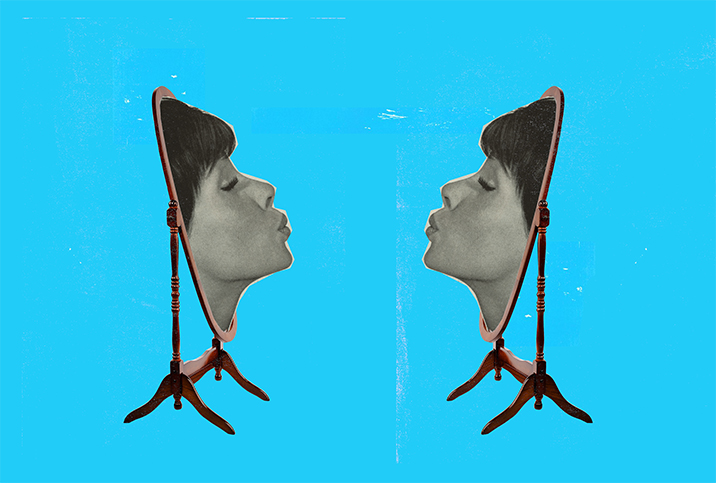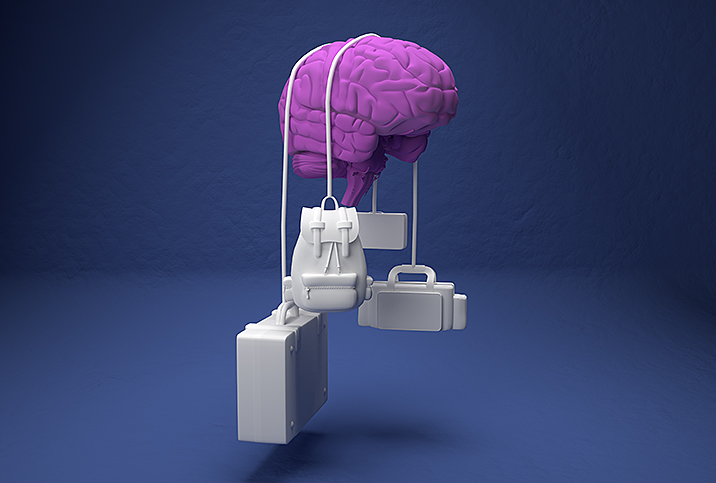What Is Groundhogging and Why Do People Do It?

Key Points
- Groundhogging is an unhealthy relationship pattern in which someone dates the same type of person repeatedly.
- There's a good chance groundhogging is the result of unresolved emotional trauma.
- Through self-reflection and therapy, though, you can deal with that trauma and get out of this unproductive cycle of dating.
Some dating myths say you live and learn, but groundhogging—that's dating the same type of person repeatedly—might make it seem like you're spinning on a dating hamster wheel. Why are you doing it?
Experts have some reasons they think people engage in this behavior and some strategies to get off of this unhealthy wheel.
What is groundhogging?
A typical part of the dating experience for most people is finding yourself with a partner who, for whatever reason, is not right for you. After breaking up, you lean on support from your friends and, at some point, enter another relationship.
In the classic Bill Murray film "Groundhog Day," the main character is trapped in a cycle of reliving the same day—hence the term "groundhogging" to explain the concept of repeatedly dating the same kind of person.
"Groundhogging refers to the pattern of repeatedly entering into the same type of unhealthy romantic relationship over and over, expecting different results each time. It's like being stuck in a loop," said Asma Rehman, L.P.C., the founder and director of Grief Recovery Center in Houston.
The term was coined by the dating app Inner Circle. Only 1 in 5 singles report that dating their "type" is going well, according to Stylist.
Groundhogging can happen before you even meet someone. You're more likely to swipe right on a dating app on a potential match who, for whatever reason, seems familiar.
Having a romantic relationship type isn't inherently a sign of groundhogging; it's more about the behavior of the type.
Why do women keep dating the same type of person and expect different results?
People engage in groundhogging for a few different reasons. The behavior may best be explained by a term that the father of psychoanalysis, Sigmund Freud, called repetition compulsion, or unconsciously replaying elements of a traumatic event or history.
"Most of the time, when people are referring to groundhogging, they are using it to describe relationships that are not fulfilling," said Sefora Janel Ray, M.F.T., a therapist with Therapy to Thrive in California. "So why would someone keep creating unfulfilling relationships?"
You might be subconsciously trying to work out the past problem. People may groundhog to seek closure by recreating a past relationship and hope for a different outcome, according to Rehman.
"Insecure attachment from childhood can drive people to 'reconnect' with unreliable or inconsistent partners that mimic early caretakers," Rehman said.
Other reasons why people may groundhog, according to Rehman, include the following:
- Familiarity. Toxic relationship dynamics can feel comfortable, and people may subconsciously seek out partners that fit a certain familiar archetype.
- Trauma bonding. Past abuse or neglect can make unhealthy attachment styles feel normal.
- Low self-worth. People with low self-esteem may feel they don't deserve a healthy relationship, so they are more likely to tolerate red flags and toxicity.
Further reasons people engage in groundhogging behavior may include the following, according to Ray:
- Not receiving emotional support
- Past experiences of unreliable people when you seek care
- A normalized experience of conflict
- Learning that repair in conflict doesn't exist
Someone may have learned that to get attention things have to be dire or you have to make a commotion as a child, which could influence groundhogging later in life, Rehman said. It's no surprise that someone's past can influence their present dating.
Physical or emotional abuse during childhood can contribute to someone later tolerating harmful behavior, a 2017 study suggested.
Recommended
- How Your Attachment Style Can Impact Your Relationships: You can learn how to heal your attachment style despite the one formed during childhood.
- Understanding Attachment Styles Helps You Find and Keep Love: Which of the three styles are you? Define your relationship needs to find the right partner.
- Giddy Presents The Naked Truth: Consistency In A Relationship: AASECT-certified sex therapist Savannah Van Besien answers your most intimate questions. This time, it's about consistency and your partner.
Is it wrong to keep dating the same kind of person?
Dating the same kind of person might not be the best idea for your mental health. Staying in this cycle can have negative interpersonal effects, including how you connect with others.
"When you stay in dynamics that continue to repeat unhealthy patterns, you continue to confirm negative beliefs about what's possible in a relationship," Ray said. "Often, you feel victimized by others in a relationship or limited in what's possible for yourself. You can also feel disconnected from who you want to be in the world and your own happiness and joy."
How do you know if you are groundhogging?
A partner whose patterns seem familiar may be a sign it's time for you to reflect on your dating history. Groundhogging could lead to dating fatigue. You may feel stuck in a rut.
Having the same fight with partners could be a sign of groundhogging. Other signs of groundhogging, according to Ray, include the following:
- You feel unseen.
- You chase others for intimacy.
- You are only attracted to emotionally unavailable people.
- You feel uncomfortable if someone truly likes you or is emotionally available.
How can you break the romantic relationship mold?
Groundhogging is usually a sign of unhealed trauma that needs attention.
"To break the groundhogging cycle, it's important to work on self-reflection to understand your patterns," Rehman said. "Seek counseling to address underlying wounds or attachment issues. Build your self-worth, and be mindful of who you are attracting and why."
To help create boundaries around what you will and won't tolerate in future relationships, reflect on repetitive red flags in partners or behaviors that felt damaging and historical. Have your own interests and maintain your identity.
If you're receiving counseling or doing work around the cycle, it can be helpful to take yourself off the dating market while you reset your relationship compass, Rehman said. Taking a break can help you avoid feeling jaded or experiencing extreme anxiety in dating.
Bad dating advice would say you just haven't met the right person yet, but if you've been groundhogging, it may be more difficult for you to recognize and make healthy connections.
The bottom line
Many explanations have been offered as to why people groundhog. Do you have a nagging feeling your exes all exhibited similar behavior? It could be a sign you're in this kind of unhealthy cycle.
Therapists who specialize in attachment and relationships can help you break the pattern.


















